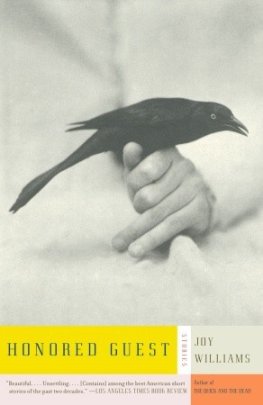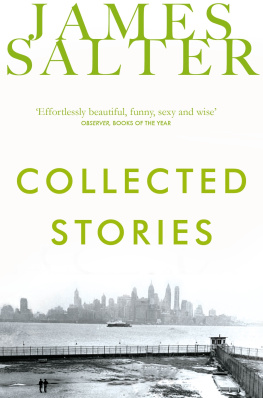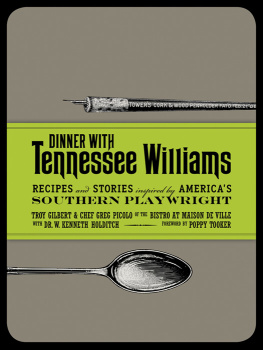Joy Williams
The Visiting Privilege: New and Collected Stories
For Rust,
and to Caitlin and Cole
Behold, I tell you a mystery; We shall not all sleep, but we shall all be changed,
In a moment, in the twinkling of an eye
1 CORINTHIANS 15:5152
Jones, the preacher, has been in love all his life. He is baffled by this because as far as he can see, it has never helped anyone, even when they have acknowledged it, which is not often. Joness love is much too apparent and arouses neglect. He is like an animal in a traveling show who, through some aberration, wears a vital organ outside the skin, awkward and unfortunate, something that shouldnt be seen, certainly something that shouldnt be watched working. Now he sits on a bed beside his wife in the self-care unit of a hospital fifteen miles from their home. She has been committed here for tests. She is so weak, so tired. There is something wrong with her blood. Her arms are covered with bruises where they have gone into the veins. Her hip, too, is blue and swollen where they have drawn out samples of bone marrow. All of this is frightening. The doctors are severe and wise, answering Joness questions in a way that makes him feel hopelessly deaf. They have told him that there really is no such thing as a disease of the blood, for the blood is not a living tissue but a passive vehicle for the transportation of food, oxygen and waste. They have told him that abnormalities in the blood corpuscles, which his wife seems to have, must be regarded as symptoms of disease elsewhere in the body. They have shown him, upon request, slides and charts of normal and pathological blood cells that look to Jones like canaps. They speak (for he insists) of leukocytosis, myelocytes and megaloblasts. None of this takes into account the love he has for his wife! Jones sits beside her in this dim pleasant room, wearing a gray suit and his clerical collar, for when he leaves her he must visit other parishioners who are patients here. This part of the hospital is like a motel. Patients can wear their regular clothes. The rooms have desks, rugs and colorful bedspreads. How he wishes that they were traveling and staying overnight, this night, in a motel. A nurse comes in with a tiny paper cup full of pills. There are three pills, or rather, capsules, and they are not for his wife but for her blood. The cup is the smallest of its type that Jones has ever seen. All perspective, all sense of time and scale seem abandoned in this hospital. For example, when Jones turns to kiss his wifes hair, he nicks the air instead.
Jones and his wife have one child, a daughter, who, in turn, has a single child, a girl born six months ago. Joness daughter has fallen in with the stars and is using the heavens, as Jones would be the first to admit, more than he ever has. It has, however, brought her only grief and confusion. She has left her husband and brought the baby to Jones. She has also given him her dog. She is going to Mexico, where soon, in the mountains, she will have a nervous breakdown. Jones does not know this, but his daughter has seen it in the stars and is going out to meet it. Jones quickly agrees to care for both the baby and the dog, as this seems to be the only thing his daughter needs from him. The day of the babys birth is secondary to the positions of the planets and the terms of houses, quadrants and gradients. Her symbol is a bareback rider. To Jones, this is a graceful thought. It signifies audacity. It also means luck. Jones slips some money in the pocket of his daughters suitcase and drives her to the airport. The plane taxis down the runway and Jones waves, holding all their luck in his arms.
One afternoon, Jones had come home and found his wife sitting in the garden, weeping. She had been transplanting flowers, putting them in pots before the first frost came. There was dirt on her forehead and around her mouth. Her light clothes felt so heavy. Their weight made her body ache. Each breath was a stone she had to swallow. She cried and cried in the weak autumn sunshine. Jones could see the veins throbbing in her neck. Im dying, she said. Its going to take me months to die. But after he had brought her inside, she insisted that she felt better and made them both a cup of tea while Jones potted the rest of the plants and carried them down cellar. She lay on the sofa and Jones sat beside her. They talked quietly with each other. Indeed, they were almost whispering, as though they were in a public place surrounded by strangers instead of in their own house with no one present but themselves. Lets go for a ride, Jones said. His wife agreed.
Together they ride, through the towns, for miles and miles, even into the next state. She does not want to stop driving. They buy sandwiches and milk shakes and eat in the car. Jones drives. They have to buy more gasoline. His wife sits close to him, her eyes closed, her head tipped back against the seat. He can see the veins beating on in her neck. Somewhere there is a dreadful sound, almost audible. Jones presses her cold hand to his lips. He thinks of some madness, running out of control, deeply in the darkness of his wife. Just dont make me go to the hospital, she pleads. Of course she will go there. The moment had already occurred.
Jones is writing to his daughter. He received a brief letter from her this morning, telling him where she could be reached. The foreign postmark was so large that it almost obliterated Joness address. She did not mention either her mother or the baby, which makes Jones feel peculiar. His life seems as increate as his Gods life, perhaps even imaginary. His daughter told him about the town in which she lives. She does not plan to stay there long. She wants to travel. She will find out exactly what she wants to do and then she will come home again. The town is poor but interesting and there are many Americans there her own age. There is a zoo right on the beach. Almost all the towns, no matter how small, have little zoos. There are primarily eagles and hawks in the cages. And what can Jones reply to that? He writes, Everything is fine here. We are burning wood from the old apple tree in the fireplace and it smells wonderful. Is the baby up to date on her polio shots? Take care. Jones uses this expression constantly, usually in totally unwarranted situations, as when he purchases pipe cleaners or drives through tollbooths. Distracted, Jones writes off the edge of the paper and onto the blotter. He must begin again. He will mail this on the way to the hospital. They have been taking X-rays for three days now but the pictures are cloudy. They cannot read them. His wife is now in a real sickbed with high metal sides. He sits with her while she eats her dinner. She asks him to take her good nightgown home and wash it with a bar of Ivory. They wont let her do anything now, not even wash out a few things. You must take care.
Jones is driving down a country road. It is the first snowfall of the season and he wants to show it to the baby, who rides beside him in a small cushioned car seat all her own. Her head is almost on a level with his and she looks earnestly at the landscape, sometimes smiling. They follow the road that winds tightly between fields and deep pinewoods. Everything is white and clean. It has been snowing all afternoon and is doing so still, but very very lightly. Fat snowflakes fall solitary against the windshield. Sometimes the baby reaches out for them. Sometimes she gives a brief kick and cry of joy. They have done their errands. Jones has bought milk and groceries and two yellow roses that are wrapped in tissue and newspaper in the trunk, in the cold. He must buy two on Saturday as the florist is closed on Sunday. He does not like to do this but there is no alternative. The roses do not keep well. Tonight he will give one to his wife. The other he will pack in sugar water and store in the refrigerator. He can only hope that the bud will remain tight until Sunday, when he brings it into the terrible heat of the hospital. The baby rocks against the straps of her small carrier. Her lips are pursed as she intently watches the fields, the trees. She is warmly dressed and wearing a knitted orange cap that is twenty-three years old, the age of her mother. Jones found it just the other day. It has faded almost to pink on one side. At one time, it must have been stored in the sun. Jones, driving, feels almost gay. The snow is so beautiful. Everything is white. Jones is an educated man. He has read Melville, who says that white is the colorless all-color of atheism from which we shrink. Jones does not believe this. He sees a holiness in snow, a promise. He hopes that his wife will know it is snowing even though she is separated from the window by a curtain. Jones sees something moving across the snow, a part of the snow itself, running. Although he is going slowly, he takes his foot completely off the accelerator. Look, darling, a snowshoe rabbit. At the sound of his voice, the baby stretches open her mouth and narrows her eyes in soundless glee. The hare is splendid. So fast! It flows around invisible obstructions, something out of a kind dream. It flies across the ditch, its paws like paddles, faintly yellow, the color of raw wood. Look, sweet, cries Jones, how big he is! But suddenly the hare is curved and falling, round as a ball, its feet and head tucked closely against its body. It strikes the road and skids upside down for several yards. The car passes around and avoids it. Jones brakes and stops, amazed. He opens the door and trots back to the animal. The baby twists about in her seat as well as she can and peers after him. It is as though the animal had never been alive at all. Its head is broken in several places. Jones bends to touch its fur, but straightens again without doing so. A man emerges from the woods, swinging a shotgun. He nods at Jones and picks the hare up by the ears. As he walks away, the hares legs rub across the ground. There are small crystal stains on the snow. Jones returns to the car. He wants to apologize but does not know for what. His life has been devoted to apologetics. It is his profession. He is concerned with both justification and remorse. He has always acted rightly, but nothing has ever come of it. Oh, sweet, he says to the baby. She smiles at him, exposing her tooth. At home that night, after the babys supper, Jones reads a story to her. She is asleep, panting in her sleep, but Jones tells her the story of al-Boraq, the milk-white steed of Mohammed who could stride out of the sight of mankind with a single step.

















